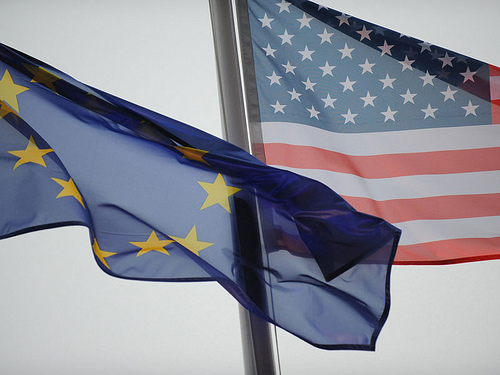
NATO defense ministers meet in Brussels to discuss the situation in Libya, and France recognizes the Libyan rebel leadership as the country’s legitimate government.
HEADLINES:
Live Streaming of NATO Defense Ministerial Meetings – (NATO)
Defense Budgets: Daily Chart – (The Economist)
EU, NATO leaders meet for crunch talks on Libya (Deutsche Welle)
NATO Defense ministers are meeting in Brussels for a two day summit to discuss the events in North Africa, while EU foreign ministers meet ahead of an emergency EU meeting on the same topic. This comes following France’s recognition of the opposition National Council, Gemrany’s decision to freeze Gaddafi’s assets, German and British efforts for a unified EU front, and Gaddafi’s attempts to send envoys to European capitals.
Libya: France recognises rebels as government (BBC News)
France has become the first country to recognise the Libyan rebel leadership, the National Libyan Council (NLC), as the country’s legitimate government.
EU to target Lukashenko money men in new sanctions (EUobserver)
EU diplomats are preparing top-up sanctions on Belarus after President Alexander Lukashenko jailed protesters for up to four years and amid reports of torture by his secret police, the KGB.
The new measures are designed to cause pain for the leader’s state budget and private income but to avoid a shock to the country’s economy or to EU companies in Latvia, Lithuania, the Netherlands and Poland.
Georgia-Russia WTO Raised in Biden’s Moscow Talks (Civil Georgia)
According to Russian Prime Minister’s deputy chief of staff, Yuri Ushakov, the U.S. Vice President Joe Biden told PM Vladimir Putin at a meeting on March 10 in Moscow that Washington had advised Tbilisi not to hinder Moscow’s WTO bid.
“Americans had a conversation with [Tbilisi], that there is no need to impede Russia’s [WTO] accession,” RIA Novosti news agency reported quoting Ushakov.
Oil revenue gives Russia some breathing room (Washington Post)
With the price of oil climbing to more than $100 a barrel, Russia has a little more weight to throw around on the world stage, and is doing just that.
The stepped-up flow of petro-dollars into the government’s coffers relieves what had been a worrisome budget deficit and lessens the urgency of reform. Good relations with the West – and especially the "reset" with Washington – are not quite so pressing when the economy here is in good shape.
Parliament calls for EU strategy on Roma inclusion (EurActiv)
The European Parliament yesterday (9 March) threw its weight behind an EU-wide strategy to support the social inclusion of Roma communities, but the European Commission is insisting that this should mainly be seen as the responsibility of national governments.
‘More Realism Would Do No Harm’ (Der Spiegel)
The European Union as well as NATO are meeting this week to discuss the notion of a no-fly zone in Libya. Offering protection from Gadhafi’s jets for the rebels may sound noble, but German commentators on Thursday are skeptical. A no-fly zone, they argue, would mean nothing short of war.
EU paralysis drives fresh bond rout (The Telegraph)
Portugal edged closer to the brink yesterday, having to pay almost 6pc to raise two-year debt. The yield on 10-year bonds briefly surged to 7.8pc after the Chinese rating agency Dagong downgraded the country’s debt to BBB+.
"These levels of interest rates are not sustainable over time," said Carlos Costa Pina, secretary of the Portuguese Treasury, blaming the latest upset on the lack of a coherent EU debt strategy rather any failing by Portugal to deliver on austerity.
EDITORIALS AND COLUMNS:
At 150, Italy gives the lie to the stories we tell the world about Europe (The Guardian)
There are eight uncomfortable truths that Berlusconi’s kingdom reveals about an ancient and modern European project
Compiled with the assistance of Klee Aiken.
Image: transatlantic.jpg
